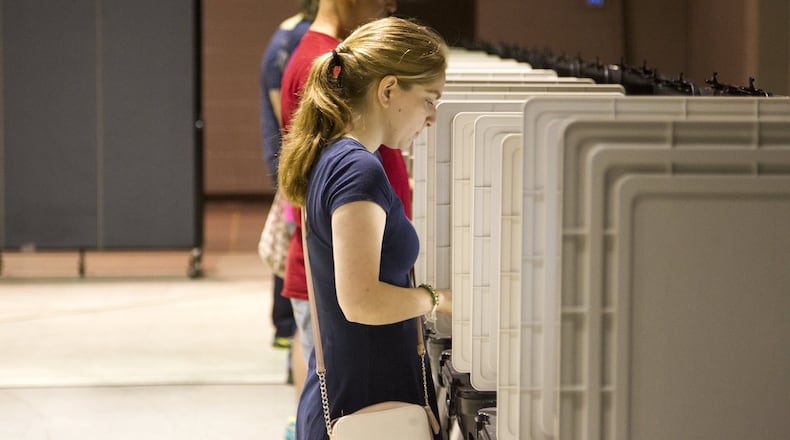The Democratic primaries for the Atlanta region’s two most closely watched congressional elections appeared headed toward extra innings, based on Tuesday’s early voting results.
In Georgia, election runoffs are triggered when no single candidate captures more than 50 percent of the vote.
In the state’s 6th District — which includes parts of Cobb, DeKalb and Fulton counties — first-time candidate Lucy McBath was leading the pack of Democrats, followed by Kevin Abel and Bobby Kaple. Steven Griffin was a distant fourth. They are vying to take on Republican U.S. Rep. Karen Handel of Roswell. Handel had no opponent on the GOP primary ballot.
Meanwhile, Carolyn Bourdeaux and David Kim were neck and neck and had begun to open up substantial leads over the four other candidates in their party’s primary for Lawrenceville Republican Rob Woodall’s 7th District seat. Kathleen Allen, Melissa Davis, Ethan Pham and Steve Reilly were also vying for the Democratic Party nomination. That district hadn’t seen a Democratic primary fight in years. In the GOP primary, Woodall had a convincing lead over Shane Hazel, a U.S. Marine Corps veteran, according to early poll results.
Saying she was still waiting for final election results, Bourdeaux, a Georgia State University professor from Suwanee, took to Twitter just after 11 p.m. to thank her supporters.
“We are excited to continue our work tomorrow,” she tweeted. “The #BlueWave2018 is coming!”
Kim, who founded a tutoring business, thanked his supporters at a festive campaign party in Duluth.
“Now the race goes on,” Kim said. “The field is just a little bit smaller. We don’t get a day off this Memorial Day Weekend. We have to redouble our efforts and tell our story. We will continue to build a powerful coalition of neighbors, uniting our glorious diverse community and take back the 7th.”
For years, Democrats did not seriously contest congressional seats in Atlanta's staunchly Republican northern suburbs. But changing demographics and the political groundswell on the left following President Donald Trump's election, combined with last year's surprisingly competitive 6th District special election, invigorated Democratic circles in the run-up to this year's primary.
A record number of women stepped up to run for congressional seats, as well as several first-generation Americans. Nearly all the Democratic challengers looked to appeal to their party's left flank ahead of the primary, adopting staunchly anti-Trump positions on issues such as immigration,gun rights and health care. Several vowed to buck Nancy Pelosi for speaker should their party win control of the House in November.
Meanwhile, many of the Democratic challengers said it was too soon for their party to push for impeaching Trump on Capitol Hill. Few if any of them publicly embraced the campaign from some prominent liberals, including California-based megadonor Tom Steyer, to boot the commander-in-chief ahead of the midterms. Most have either dodged the question entirely or argued that Congress should wait until after special counsel Robert Mueller concludes his investigation of Russia’s involvement in the 2016 election before making any decisions.
Handel and Woodall largely avoided the spotlight in the run-up to the primary. Woodall fully and unapologetically backed Trump as he ran for a fifth term in his district, a majority-minority immigrant hub that narrowly voted for Hillary Clinton in 2016. Meanwhile, Handel fundraised heavily to steel herself against future political attacks.
“While the Democrats will continue to pump outside money into our community leading into their July runoff,” Handel said in a statement released late Tuesday, “I will remain committed to lowering the taxes on hardworking families and small business, cutting over-burdensome regulations, strengthening our military, standing with Israel, honoring our commitment to our veterans, and combating the opioid crisis. This is my focus in Washington and the district — every day.”
Despite the energy on the left, none of the congressional races achieved anything close to the circuslike quality that characterized last year's 6th District special election and made it one of the nation's most expensive. The parties, major donors and super PACs largely sat on the sidelines or focused on other, more competitive contests. Georgia's open governor's race also siphoned off much of the money and attention.
All 14 of Georgia’s U.S. House members are up for re-election this year, and 12 face opposition of some kind. Most if not all are expected to win their seats in November since incumbents tend to enjoy superior name identification and fundraising help.
Keep Reading
The Latest
Featured




